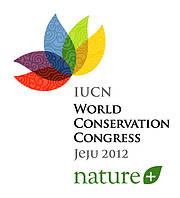Journey through Jeju towards the first IPBES plenary
29 August 2012 | News story
A guide to key events on IPBES at the forthcoming IUCN World Conservation Congress is now available. It includes discussions on IUCN's role in IPBES, a workshop on how IPBES can bring us further in conserving the world's biodiversity, training sessions on IUCN's flagship knolwedge products, and a number of other events of relevance to science-policy links.
The IUCN World Conservation Congress will include:
- 10 September 2012: Workshop on how can IPBES bring us further in conserving the world´s biodiversity? (live streaming to be confirmed);
- 11 September 2012: Discussions on the IPBES-related motions at the Member's Assembly;
- 11 September 2012: Event on what could the IPBES do for building capacities?
- 12 September 2012: Event on making the best use of the IUCN Red List with IPBES;
- A number of other events relevant to the science-policy interface.
About IPBES
The Intergovernmental science-policy Platform on Biodiversity and Ecosystem Services (IPBES) intends to be an independent global body aiming to link scientific communities and policy-makers. Established on 21 April 2012 and to be based in Bonn, Germany, it will equal the Intergovernmental Panel on Climate Change (IPCC) for issues directly linked with nature conservation, food security, sustainable development and human well-being. Measuring the latest trends of biodiversity and ecosystem services and identifying policy relevant tools, it will shape the international agenda and set the scene for legitimate and credible knowledge to inform policy making.
IUCN for IPBES
IUCN, due to its extensive experience with science, knowledge and policy tools on biodiversity and ecosystem services, and its nature as a multi-stakeholder union bringing together over 1,200 government and non-government member organizations and engaging 12,000 scientists in a unique knowledge network of 6 Commissions, has a lot to offer to IPBES. Having contributed to the negotiation process for the establishment of IPBES since 2008, IUCN is ready, willing, and able to support the work of IPBES.



